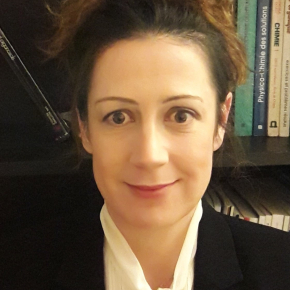Géraldine Masson aims for "zero waste"
Géraldine Masson is the research director of the "Catalysis and Organic Synthesis" team of the Institute of Chemistry of Natural Substances.
She has already received several awards, including the CNRS bronze medal and the Novacap prize of the Academy of Sciences. Géraldine Masson is a chemist who aims for zero waste when she practices research. Her goal is to produce chiral molecules in the cleanest possible way.
Tomorrow's chemistry will have to be green. In any case, this is Géraldine Masson's opinion and that is what she has been working on from her bench in the Institute of Chemistry of Natural Substances in Gif-sur-Yvette. This researcher coordinates a team of experimental scientists in her laboratory that targets new ways of syntheses. On a daily basis, the chemist asks herself 'how can we develop new synthetic tools for example by combining efficiency and respect for the environment? These tools will be used to reach a new or already known molecule, such as those used in a drug.' The answer is more often a marathon than a fitness circuit. "We are looking for challenges and difficulties. Challenges of synthesis will force us to make complex links or out of the ordinary molecular architectures. We want to succeed in the building of synthesis pathways that no-one has ever thought of."
Thus, by exploring the cross-roads, this researcher has received recognition by her peers. She was a CNRS medal winner in 2013, and was awarded the first Novacap prize by the Academy of Sciences in 2017. Furthermore, she is a member of several scientific societies such as the German Chemical Society and the Japan Society for the Promotion of Science. Géraldine Masson perceives this recognition as a direct result of the choices she made very early, during her post-doc in 2005. "It's amazing," says the amused researcher. "During this post-doc, I had to develop enantioselective synthesis pathways to prepare molecules that have a chirality axis.
Even if all the defined aims weren't reached, this still showed me what I wanted to achieve."
In her view, Géraldine Masson is actually answering a question that had come to her during her thesis, three years earlier. "I was working on a synthesis that uses a reagent in great excess. That means that the reaction took place in an environment saturated in a certain product. After the reaction, the reagent used in excess cannot be used again and it becomes a waste-product to be thrown out or reprocessed. What I wondered above all was how could we do without samarium iodide, a metal species essential for our work but polluting for nature?" This question was to guide her research once she had received her doctorate.
A bright idea
Fifteen years later, the chemist does not regret this choice that allows her to assemble molecules whilst becoming part of sustainable chemistry. Her team is especially recognized for the synthesis of asymmetric organic molecules. Molecules that have the distinction of having a "twin" mirror image. Frequently only one of these two "reflections" is of interest. "We became interested in catalysis to develop the synthesis of chiral molecules with good "reflections" for which there were few or no efficient asymmetric methods. We developed methods that use small organic molecules functioning as enzymes. This means they specifically orient and activate molecules in the right way to allow chemical reactions to occur and they recover their initial form once their action is completed!" These "enzyme" molecules (but which actually are not) can thus serve in many reactions without ever becoming a waste-product.
Furthermore, this research has allowed these molecules to be activated by light. This process is truly original. It exploits a source of light and photocatalysts to activate any organic molecule. With these discoveries, Géraldine Masson and the chemists of the Institute of Chemistry of Natural Substances can build complex and original molecular edifices in the cleanest possible way. A necessary material to model zero waste chemistry.
